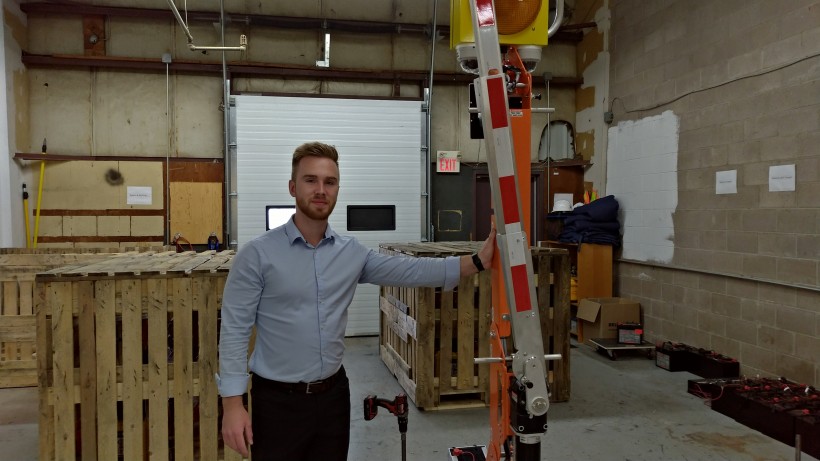Dartmouth-based Site2020’s traffic-control equipment was used on more than 200 construction sites last year, and CEO Mitch Hollohan expects to deploy another 1,000 units over the next two years.
The company’s product, the Guardian SmartFlagger, is designed to replace human “flaggers”—construction employees paid to direct traffic. It includes a portable stoplight and a barrier that can be lowered to block traffic flow.
“It increases the safety of flaggers tenfold, because you don’t have to have flaggers … in front of the road, possibly being hit by a car,” said Hollohan in an interview.
Site2020 was founded in 2015, in an alumni company at Volta and launched the Guardian in 2017 after 24 months of research and development.
A single worker can control up to four of the machines using an iPad and video-monitoring software provided by Site2020.
The Guardian is leased by construction companies, which pay by the hour. Customers are not billed for time during which the device is not in use, but they are required to pay for a minimum number of hours per month—usually about 80.
The typical hourly price is between $20.00 and $25.00, depending on which jurisdiction the construction site is located in.
“We provide the entire service,” said Hollohan. “We help them with every change that it’s going to take for their business to go from traditional flagging to automated flagging.”
Volta Presents Five Ecosytem Awards
Site2020 was initially funded by angel investors, but manufacturing of new equipment is paid for using bank financing.
Hollohan intends to fund future growth the same way, and has no plans to seek venture capital or other outside investment.
The physical Guardian equipment is not built by Site2020, but Hollohan said of the business’s manufacturing partner, “They’re connected pretty much directly to us.”
Site2020 directly employs 18 people, up from eight last year, with the manufacturing company raising the total to 36.
The technology is officially approved for use in forty-two American states and every province in Canada except Nova Scotia.
Businesses in the province have placed orders, but inflexible regulations and a complex bureaucracy have so far prevented Site2020 from fulfilling them on a consistent basis, said Hollohan.
Hollohan recalls one industry partner that spent $18,000 seeking regulatory approval to use the Guardian on a local construction site for two hours.
“We’re saving lives in the United States every single day,” he said. “But the Nova Scotia government is just too slow and too bureaucratic … to make change.”










